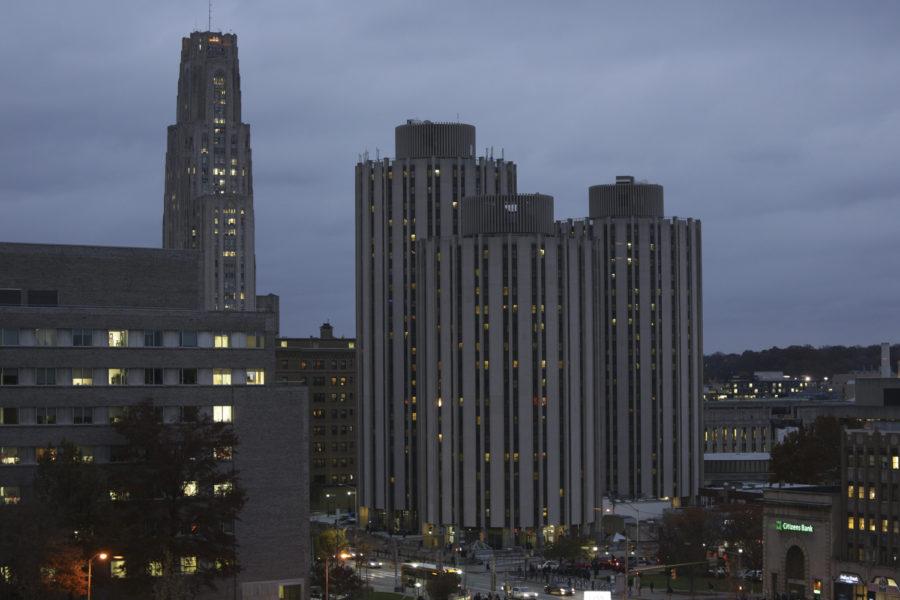Sophomore Dolan Edinboro knew he wanted to move off campus for his sophomore year. But when he started looking for apartments in the November of his first semester at Pitt, he and one of his roommates, sophomore John Kelly, were shocked to sometimes spend five or six hours a week looking for one.
“It was stressful because of the sheer volume of apartments that you find,” he said.
“And the low volume of good ones,” Kelly added.
After an arduous search, Edinboro finally found a place in North Oakland in February, where he now lives with three roommates.
He was lucky to find an apartment so late in the year. For most first-year students who don’t have the same amount of dedication, going through the apartment search in November after everyone else would be too stressful, and efforts to find a place would fizzle.
While it may be hundreds of dollars more expensive per month, living on campus through sophomore year drastically simplifies life during a time when students are acclimating to a new city, new people and the college environment. All of these benefits are simply unavailable or less easily accessible to their off-campus classmates.
Possibly the biggest downside to living on campus through sophomore year is the cost. Upperclassman dorms such as Panther and the recently renamed K. Leroy Irvis Hall cost roughly $3,700 per semester, averaging to a rent of $925 per month. The holy grail of on-campus living is Bouquet Gardens, which has a rent of a whopping $1,075 per month. This is exorbitantly high compared to the average rent in Pittsburgh, where one can typically find comfortable apartments for $700 or less per month.
But often not included in that rent are utilities. After adding electricity, gas, water and internet, that $700 apartment can soar up to $850. And Panther Central is a much better landlord than your average South Oakland one. Though on-campus dorms are more expensive, the difference is smaller than it appears at face value, and the extra cost pays for better service.
Most first-year students won’t be prepared to live on their own in an apartment in a few months. For many, living on a college campus is their first introduction to real-world chores, and even if they handle the first year well, there’s another adjustment moving off campus.
Some students don’t know how to do laundry when they first arrive on campus — or even how frequently they should do it. Others may not know how to cook. I vividly remember the pungent odor that filled Tower A last year when a student forgot to put water in their cup of mac and cheese before heating it in the microwave. When microwaving mac and cheese is a struggle, moving on to a full kitchen of culinary catastrophes isn’t likely to be a good idea.
Life off campus involves learning other fundamentals like buying groceries, doing dishes, cleaning bathrooms, fixing plumbing issues and paying rent. You end up with a responsibility that would overwhelm most students, even after their first year away from home. And if you’ve just learned how to do your laundry, you don’t need the worries of tackling all the other responsibilities of being an adult just yet.
Another benefit of living on campus is the convenience. Most first-year students live in Towers, a central location within a seven-minute walk of any academic building. Upperclassman dorms are located farther out, but even Panther Hall is within a 15-minute walk of Frick Fine Arts, the most distant academic building on campus.

For students still working out their late-night study habits, living on campus allows them to roll out of bed 10 minutes before class and still make it on time. Meanwhile, those living in South Oakland may have a 20-minute trek ahead of them, and those farther away might have a lengthy bus ride. For attending class, living on campus is most convenient.
It may not be convenient, and possibly downright claustrophobic, to cram two people and all their belongings into a 200-square-foot room, when off-campus living provides a more spacious option. But students living on campus can minimize crowding with efficient use of space.
Many first-year students would struggle to even find a suitable apartment in the first place. As most upperclassmen will tell you, students should be looking for apartments for next year already, as many of the best locations have already been signed off for the upcoming academic year.
For most first-year students, it’s too tall an order to start the search so early. These students not only have the standard burden of writing papers, finishing homework and studying for midterms, but they also have to learn what may be a new city, cope with roommate issues and navigate the college scene. Tacking on a draining apartment search is too much to handle for the average first-year student.
There may be other minor downsides to living on campus — if a student truly loves cooking, for example, then it’s annoying to live in a place without a stove or an oven. But there are living spaces on campus equipped with these kitchen essentials, like Ruskin Hall and Bouquet Gardens.
Maybe first-year students are sick of having a Resident Assistant, especially after being written up for sundry violations. And it’s definitely annoying to have to sign in a friend to hang out with them in your room. But on the flip side, RAs also serve as a fantastic resource for basic counseling and getting involved on campus — and no Pitt student living on campus ever needs to worry about a random person wandering around on their floor. If you really don’t like the idea of another year of supervision, there are dorms without RAs or security guards, too.
It’s much easier to absorb the extra cost and cope with small inconveniences of continuing to live in the dorms than it is to sort through thousands of apartments, tour the interesting ones and settle on one, all the while juggling schoolwork. So to all the first-year students who want to move off campus next year — know what you’re signing up for.
Write to Brian at [email protected].



